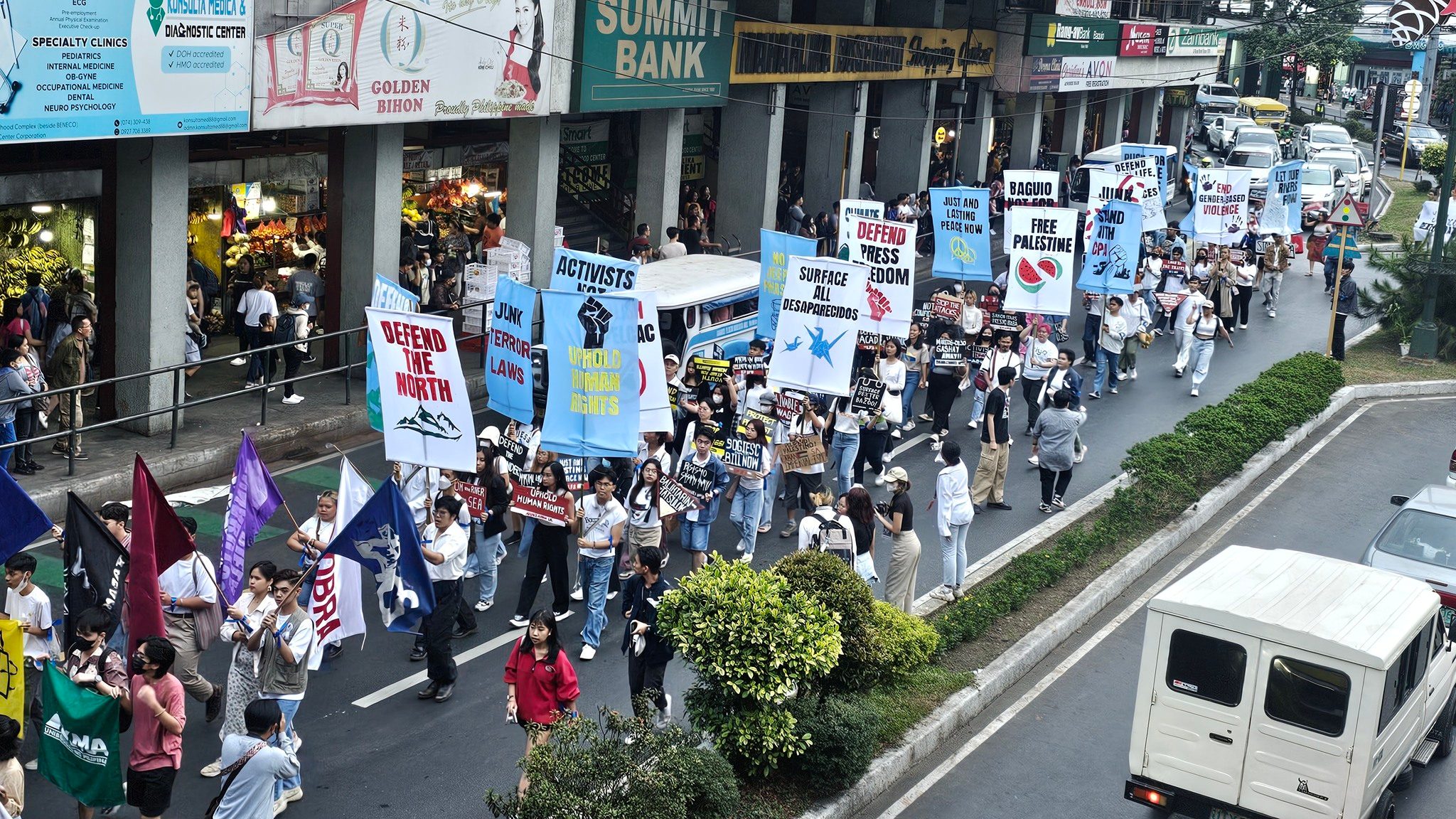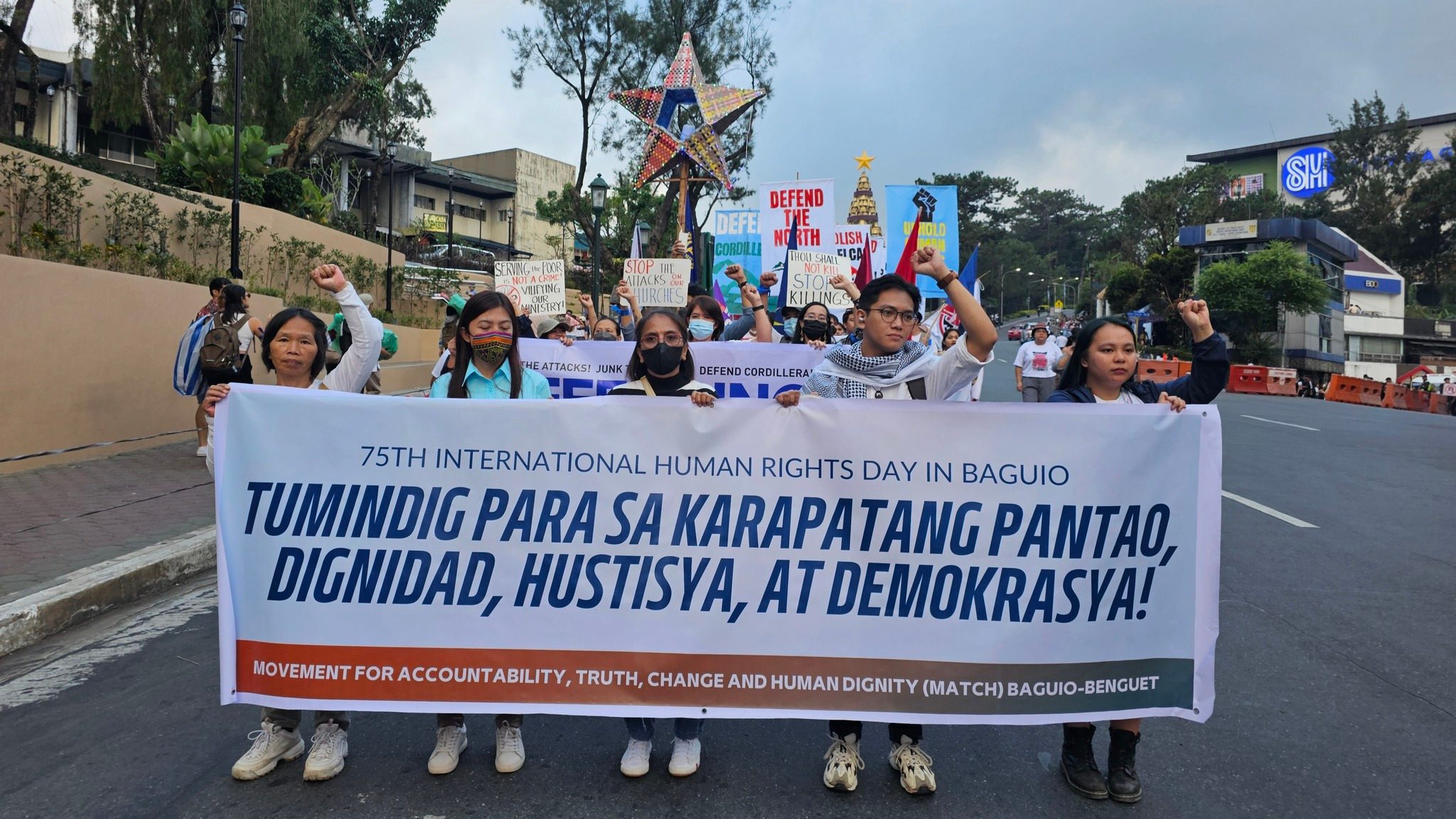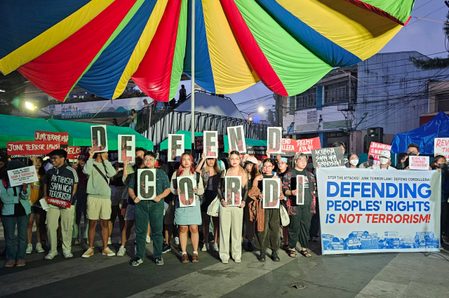SUMMARY
This is AI generated summarization, which may have errors. For context, always refer to the full article.

BAGUIO, Philippines – Curiosity and the urge to be heard made 16-year-old Piotr John join the International Human Rights Day commemoration in Baguio on Sunday, December 10. It was his first time to take part in a protest rally.
“I was about to leave when I saw their placards,” he said.
Asked about the significance of being part of the protest, he answered, “We are speaking for the voiceless.”
The 11th-grade humanities and social sciences student added, “We need to actively take part because being passive does not help. This is necessary for people and the government to take [human rights] issues seriously.”
Piotr was among the marchers down the crowded Session Road for the 75th Anniversary of the United Nations’ adoption of the Universal Declaration of Human Rights.
The activity coincided with Baguio City’s weekly Sunday closure for vehicles on the thoroughfare to allow pedestrians to enjoy the space for arts and performances.
Sunday’s protest centered on the call to remove the terrorist tag against four leaders of the Cordillera Peoples Alliance and the junking of the Anti-Terrorism Act of 2020.

At Igorot Park, Bishop Reuel Marigza of the United Church of Christ in the Philippines (UCCP) said that while the Constitution obligates the government to respect human rights, it remains crucial “to assert these rights to be observed.”
“In the midst of business-as-usual or the continuance of many of our basic problems, we call for meaningful change,” he said.
“In the violations of human rights, such as red-and-terrorist-tagging and the filing of trumped-up charges, we stand for human dignity,” the bishop added.
‘Human Rights City’
Marigza also cited the city government for declaring Baguio as an “Inclusive Human Rights City.”
He noted that as early as 2017, the city council initiated policies to ensure respect for human rights.
“We are heartened by the assurance that every citizen exercising their democratic rights is safe in the city, and active programs and initiatives must be pushed and encouraged,” he said.
Meanwhile, Maurick Ulpindo, human rights education officer of Amnesty International Philippines-University of the Philippines in Baguio, said the local government declaration was “a recognition that human rights violations are being committed.”
“This also means added accountability and a push for city officials to look into the human rights situation in the city and take steps at the institutional level to ensure [the exercise of] these rights,” he said.
Great challenge
For Ulpindo, after 75 years, the full protection and enjoyment of the rights enshrined in the UDHR remains a “great challenge” on the global and national scene.
“It remains a cycle of problems… Cases of human rights violations continue to increase. Red-tagging and enforced disappearances remain rampant,” he said.
According to him, President Ferdinand Marcos Jr’s refusal to acknowledge the atrocities committed during his father’s dictatorial rule is making things worse.
“His recognition of what transpired based on historical accounts is a minimum standard of how he views human rights. If he cannot recognize the human rights violations during the authoritarian regime, it is an indicator that he is not also inclined to the full recognition of human rights,” Ulpindo said.
But human rights activists are not the only ones bearing the brunt; even lawyers are finding it more difficult.
“It is a challenge to be a human rights lawyer,” said King Anthony Montereal of the Free Legal Assistance Group (FLAG) in Baguio.
According to Montereal, the situation in the Philippines makes it hard for them to defend their clients and fend off attacks against them for doing their job.
“Even the laws right now are used for terror, one of which is the Anti-Terrorism Act,” he said.
He explained that the law is being used to make individuals vulnerable to attacks and state persecution.
Montereal said that lawyers for activists, especially those who have been red-tagged or designated by the government as terrorists, “is a risky job.”
“As defenders of these people, we can also be red-tagged by the State, for defending our clients,” he added.
He pointed out that UDHR sets the minimum standards of what governments should accord their citizens.
“The significance of this (UDHR) is that even if there are laws created by Congress, they cannot contradict the rights protected under the UDHR. It is our basic human rights … these are unbridled rights that should be respected at all times,” Montereal said. – Rappler.com
Add a comment
How does this make you feel?




















There are no comments yet. Add your comment to start the conversation.